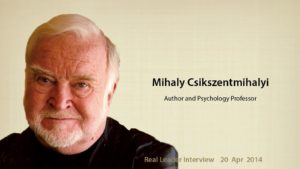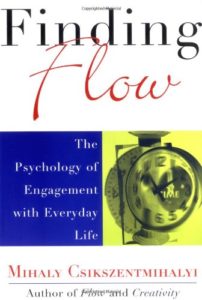
Late in October, bestselling author and pyschologist Mihaly Csikszentmihalyi passed away in California at age 87. You can read the obituary in the Washington Post here.
Czikszentmihalyi — pronounced “chick-SENT-me-high” — was a university professor who built a mini empire around the nebulous concept of Flow. See this Wikipedia entry for more on his life and work.
Back in 2015, the Hub reviewed the original Flow as well as Creativity and Flow in 2016. He explored this further with Finding Flow: The Psychology of Engagement With Everyday Life. It has the virtue of brevity when compared to the earlier two books on Flow: it runs just 180 pages, or 147 if you don’t count end matter.
Implications for Encore Careers
As noted in the earlier reviews, I’m intrigued by the concept of Flow as it applies to Encore Careers and life after corporate employment. As many blogs in the Hub’s Victory Lap section have pointed out, aging baby boomers still have a potentially long and creative period ahead of them that lies between the traditional career and what used to be called Retirement.
So it seems to me that if late-bloomer Boomerpreneurs are going to make a success of this new stage of life, they’d better tap into the concept of Flow. It’s all tied in with passion and mastery, which is why I went to the well one last time with Czikszentmihalyi.
He begins with a quotation from W.H. Auden:
“If we really want to live, we’d better start at once to try; If we don’t, it doesn’t matter, but we’d better start to die.”
This is my problem with the concept of traditional full-stop Retirement. As long as we have one foot in the working world, with community, with creativity, even with the online world, we know we are still in the land of the living. Take away all of that, and what are we left with?
 As the author notes, we can’t expect others to help us to live: “We must discover how to do it by ourselves.” It’s up to us to take charge of our lives’ direction; if we don’t “our life will be controlled by the outside to serve the purpose of some other agency.”
As the author notes, we can’t expect others to help us to live: “We must discover how to do it by ourselves.” It’s up to us to take charge of our lives’ direction; if we don’t “our life will be controlled by the outside to serve the purpose of some other agency.”
This is one thing I enjoy about being a free agent: typically when you’re employed your direction is ultimately set by a “boss.” This is why so many who become self-employed cite the desire to “be their own boss.” That boss, it goes without saying, may well be a demanding task-master: many a self-employed business person has joked “My boss is a slavedriver.”
The Paradox of Work
Ultimately, this is about deciding how to spend our time, and Finding Flow spends a fair bit of space recapping studies of where time goes in a typical day: Productive Activities take up to 24 to 60%, Maintenance Activities iike eating, grooming and driving take up 20 to 42%, and Leisure Activities take up 20 to 43%. Our happiness levels will vary with these activities, which is why Czikszentmihalyi devotes his fourth chapter to “The Paradox of Work.”
Work takes up about a third of our living time. Here’s the paradox:
“Work is a strange experience, it gives a sense of pride and identity, yet it is something most of us are glad to avoid.”
The Risks and Opportunities of Leisure
The flipside is how we use Leisure, which of course should intrigue anyone interested in traditional “Retirement” and its prospect of endless leisure time. Czikszentmihalyi observes that free time is one of the most desirable goals we can aspire to.
But consider this:
“Having leisure at one’s disposal does not improve the quality of life unless one knows how to use it effectively, and it is by no means something one learns automatically … Human beings feel best in flow, when they are fully involved in meeting a challenge, solving a problem, discovering something new.”
It turns out that the most flow is reported by those who read a lot and watch little television and the other way around.
In short, for those who are considering whether they should keep working, enter semi-retirement or an encore career, or dive right into the apparent uninterrupted freedom of traditional full-stop retirement, it’s certainly worth reading either this book or one of the other Flow titles.


